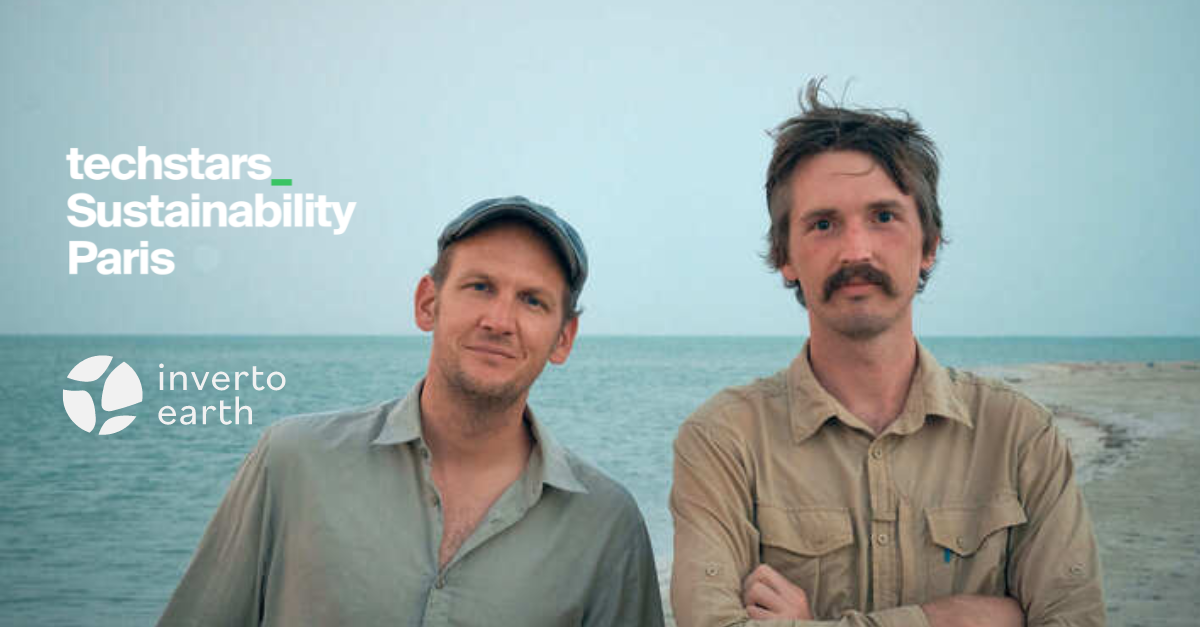Get to know Inverto Earth - Techstars Sustainability Paris Accelerator
Apr 18, 2024

Inverto Earth | Jürg Germann - CEO | Cameron Dowd - CTO
Inverto Earth aims to restore and conserve 1% of our planet's coastlines by 2030, for a tomorrow with more nature than today.
1. Describe the problem/the industry that you are trying to mediate (and precise the UN SDG-s you are solving).
An often cited statistic from the WEF claims that half of global GDP is reliant on nature. This fact has always surprised me, as long as we are still eating plants and animals I’d argue we are 100% reliant on nature. Corporate sustainability however, despite having significantly progressed since the days when polluted rivers would catch fire, still focuses predominantly on carbon as the single metric. We want to enable companies to take the next step in sustainability, look beyond offsetting and create a regenerative impact on nature, starting with our most critical ecosystems - our coastlines.
Our collaborative rewilding approach, with our technology, tools and training in the hands of local and indigenous led organisations, enables a monitored and traceable impact on the following UN SDGs:
SDG 8. Decent Work and Economic Growth
SDG 13. Climate Action
SDG 14. Life below water
SDG 15. Life on Land
SDG 17. Partnerships for the Goals.
2. How did the idea to create the company come to mind? How did your team come to be?
We’ve both always been passionate about the outdoors and nature, and the increasingly visible loss of wild places has driven us to do something about it. Cameron grew up in sub-tropical Australia, often going on bush walks with his family and loved seeing animals in the wild. But in a young country like Australia the loss of nature is also particularly visible, and he saw wetlands drained and forests cleared for development as he grew up, making it harder and harder to escape the noise of roads and just hear the sound of a healthy forest. On the other side of the world, Jürg grew up in a small town nestled in the Swiss Alps. An avid skier since childhood, he’s watched the snow line get higher and higher each year, glaciers retreating, permafrost melting, increased landslides etc. And the scary thing for both of us, these changes are within our lifetimes, it’s frightening to imagine how things look a few generations down the line.
We both met while working at a robotics focused NGO, using drones for social impact in countries all around the world. We’d been building technology to help drones deliver medications in Africa, release live mosquitoes to combat dengue fever in Fiji, and making these projects run. The frustrating part of the NGO world however, is despite all the impact we had, once the projects were over, everything stopped. We started Inverto to save our planet, and to make sure our impact was sustainable.
3. Why did you choose to participate in the Paris Techstars accelerator program? What are you looking forward to the most?
We chose to participate as we are first time founders. As we prepare for our fundraising round this year, we need all the help we can get and the support from a globally recognised accelerator program like Techstars has been invaluable. We’ve enjoyed the team spirit we’ve built with the rest of the cohort, and the network so far, and are most looking forward to making a splash on demo-day.
4. What are you the most proud of in your initial journey with your company?
We initially started in 2022, it was a leap for us into the unknown and we didn’t know if it would still be going in 6 months or not. We’ve been on this full time now for almost two years, and we’re particularly proud that we’re still going, with all the changes and learnings that we’ve made along the way.
5. How do you plan to measure the positive impact of your company in the next 5 years?
Our entire product is built on the measurement of positive impact from crucial coastal restoration and conservation projects. The metrics are built on the pillars of climate, biodiversity and social impact to ensure that the projects escape the tunnel vision that comes when the only metrics are trees planted or tons of CO2. In detail, we enable our partners to measure and report on the carbon sequestered both above and below ground (due to differences in permanence), the exact species of plants and animals detected over a project (detected using aerial imagery, camera traps, bioacoustics and environmental DNA), and the social impact measured in equivalent monetary benefits from the jobs created directly and the approximated value of the coastal protection and fisheries benefit. This allows us to concretely show not just a climate impact, but a traceable and engaging biodiversity impact down to the animals that return to a project, ensuring that biodiverse nature is restored and conserved.
Currently we self-report our metrics and are beginning to include the IRIS+ standard metrics to simplify our integration, with third party validation on our roadmap to ensure our credibility with clients.
For the latest news on our applications, please visit our page.
